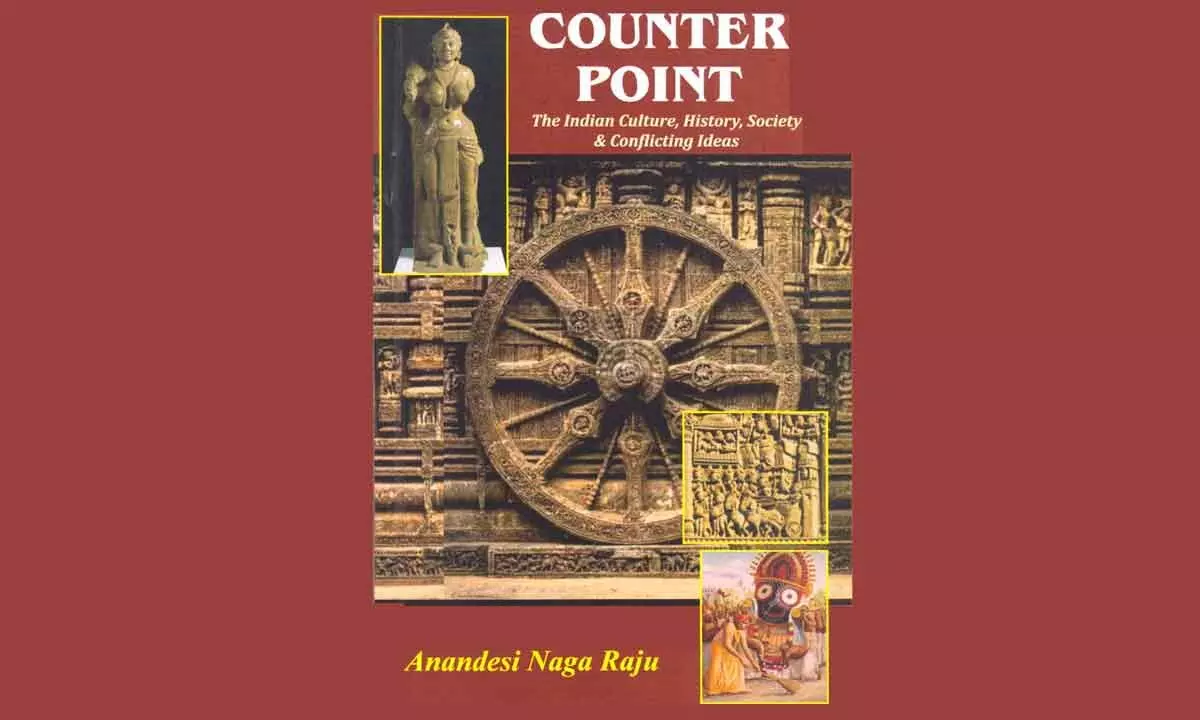Counter Point: A book that debunks myths and sheds new light on Indian history, society
This new book by Anandesi Nagaraju explores the depths of Indian culture and history, dispels myths, and offers new insights on contemporary issues
image for illustrative purpose

Citing genetic research and archaeological findings at Mohenjo-Daro and Harappa, the author debunks the widely held view of ‘Aryan invasion’ of the Indo-Gangetic plain that was said to be responsible for the demise of the Indus Valley civilization and migration of the Dravidian race to the south
Exploring the depths of Indian culture and history on the one hand and analysing its current political scene and contemporary social issues on the other within the confines of a single book - that too a slender one of 136 pages - is like trying to pass the proverbial camel through a needle’s eye. Yet, that is what Anandesi Nagaraju did, and did with remarkable aplomb, in his latest book titled ‘Counter Point – The Indian Culture, History, Society & Conflicting Ideas’.
Studying one’s national history is necessarily fraught with prejudices. That is the reason why one finds either excessive glorification or unjustified censure in scholarly works dealing with historical matters and truth escapes one’s understanding. Similarly, an objective perusal of current affairs and contemporary social issues is often doped with one’s emotional or ideological predispositions, so what emerges out of expert analyses is not reality but rather it’s skewed up shadow. The author is acutely conscious of these pitfalls and therefore vows to adopt a strictly scientific approach based on genetic , archaeological, geological and anthropological evidences to unravel the mysteries of ‘the origin and decline of the Indus Valley civilization…, Aryan invasion theory, Aryan-Dravidian divide…,genetic differences between different castes…’. He also draws upon ancient texts like the Vedas, Upanishads, Epics, Puranas, Kautilya’s Arthashastra, Kathasaritsagara, the Jataka tales etc. to fathom the social customs and practices of those times, rather than put up with the necessarily subjective and superficial observations recorded by medieval travellers like Hiuen Tsang and others.
The upshot of this new approach is the many astounding revelations that the book lays bare before the reader. Citing genetic research and archaeological findings at Mohenjo-Daro and Harappa, the author debunks the widely held view of ‘Aryan invasion’ of the Indo-Gangetic plain that was said to be responsible for the demise of the Indus Valley civilization and migration of the Dravidian race to the south. Stating that the North-South divide in history is ‘superficial’, the author bemoans the fact that ‘our history textbooks are not updated as per the latest discoveries’ because of the biased approach of ‘h(d)istorians’, with the result that today we seem to know ‘more about Mesopotamian, Sumerian and Chinese civilizations than our own culture and history’. The pages of the book contain many other such radical ideas that serve as an eye opener to the reader.
Quoting extensively from the Arthashastra of Kautilya, the author establishes that the concept of ‘nation-state’ was well known to the Mauryans long before the same was postulated by the Greeks in the West. On the ticklish issue of Legislature Vs Judiciary in the context of the Indian Constitution and its ‘Basic Structure’, the author argues that, in the final analysis, it is the Judiciary that should have the last word (rather than the Legislature) lest the Constitution should sub-serve the interests of the political party in power at critical times. On the issue of Secularism, the author rubbishes the view held by some that it is a ‘western’ notion, so ‘antithetical to our value system’. Far from being western, he recalls our own native concepts of ‘Dharma Nirapeksha’ and ‘Sarva Dharma Samabhavam’ which are the same as Secularism. The author minces no words in decrying the many social ills plaguing our society e.g., religious extremism, hate speeches, below-the-belt politics and our obsession with caste. Dismissing the panic expressed by some that AI would one day overtake the human race as unfounded, the author, on the contrary, advocates greater adoption of scientific and technological advances in our public life, as science and scientific temper have the ability to unite mankind, while religion (in its narrow sense) tends to divide.
Hats off to the author for the vast array of sources on which he based his thoughts, the range of topics covered and the objective manner in which contentious political issues are dealt with. At a time when public interest in the Indian Knowledge Systems (IKS) is showing resurgence, publication of this book is a timely value-addition to the academic minded scholars in particular and to the reading public in general.
(The author is a retired Tahsildar, a freelance journalist, artist and guitar enthusiast. His writings on Indian history, culture and polity were published as the book Alternative Perspective)

